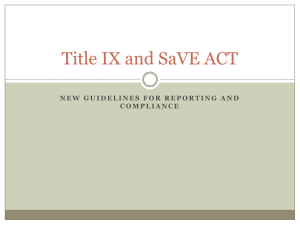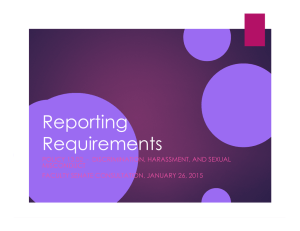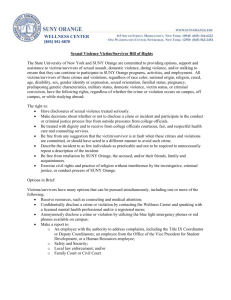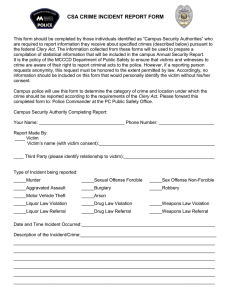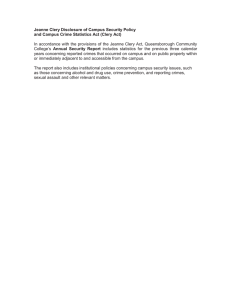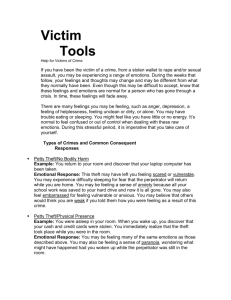Campus Security Authority Reference Manual Clery Act Reporting
advertisement
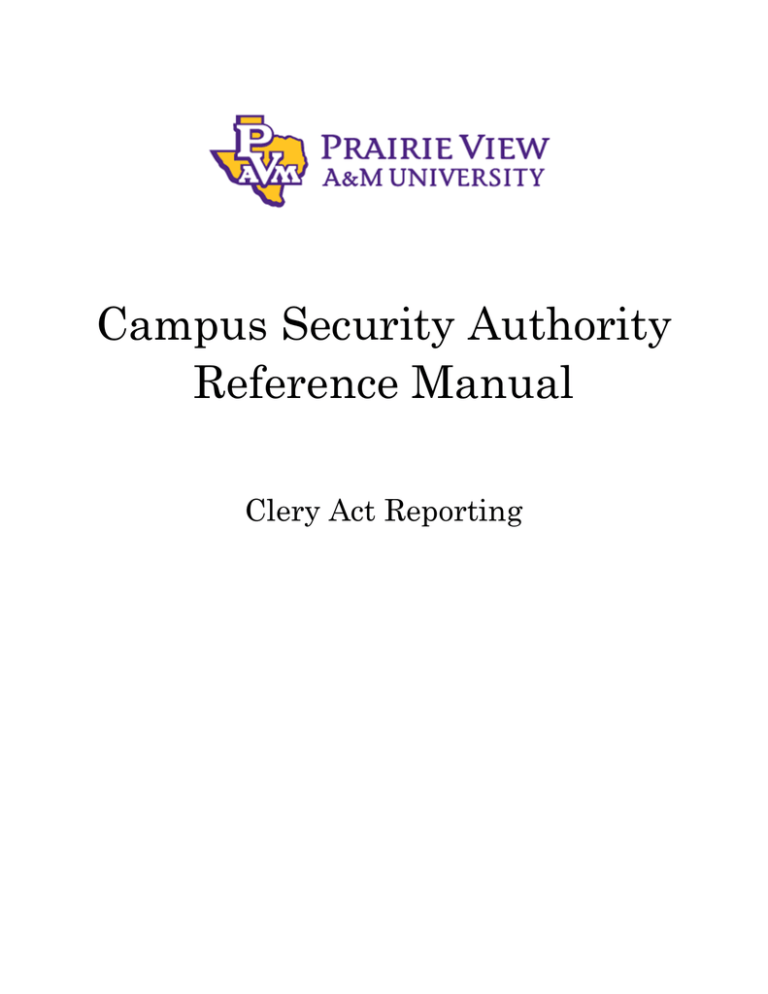
Campus Security Authority Reference Manual Clery Act Reporting Table of Contents Introduction 1 CSAs and Their Responsibilities 1 CSA Reporting 2 Criminal Offenses that are Required to be Reported 2 Victim Assistance 7 Missing Students 11 Introduction In 1990, Congress enacted the Crime Awareness and Campus Security Act of 1990, which amended the Higher Education Act of 1965. This act required all postsecondary institutions participating in Title IV federal financial aid programs to disclose certain campus crime statistics and security information. The act has been amended several times, and has been renamed the Jeanne Clery Disclosure of Campus Security Policy and Campus Crime Statistics Act in memory of a Lehigh University student who was murdered in her dorm room in 1986. It is generally referred to as the Clery Act. The purpose of the Clery Act is to provide the members of the campus community with accurate, complete and timely information about crime and the safety of the campus environment so they can make informed decisions to keep themselves safe. The Clery Act requires universities to disclose crime statistics to the Department of Education on an annual basis. The crime statistics are derived from reports obtained from local law enforcement agencies and Campus Security Authorities. Reports from Campus Security Authorities can also serve as the basis for Timely Warnings in the event of Clery crimes that may pose a serious or continuing threat to the campus community. CSAs and their Responsibilities Campus Security Authority (CSA) is a Clery-specific term referring to individuals having crime reporting responsibilities under the Clery Act. For these purposes, all PVAMU employees are considered to be CSAs. CSAs are responsible for reporting allegations of Clery Act crimes that they conclude were made in good faith (i.e., there is little or no reason to doubt the validity of the information) using the mechanism established by PVAMU: https://publicdocs.maxient.com/reportingform.php?PrairieViewAMUniv&layout_id= 10 If a CSA is unsure whether or not a given allegation of a crime needs to be reported, they should pass the information along so that it may be evaluated for inclusion in Clery statistics. CSAs are not responsible for soliciting crime reports, determining whether a crime definitely took place, investigating crimes, confronting or apprehending alleged perpetrators, trying to convince victims of crimes to contact law enforcement or filing police reports on behalf of victims or reporting parties. CSAs should report crimes that they witness, or are victims of, directly to the appropriate law enforcement agency. CSAs who become aware of an emergency 1|Page situation requiring a law enforcement, fire, medical or psychological response should call 911 immediately. CSA Reporting When reporting an allegation of a crime, CSAs should provide as much information about the incident as they can, to include: The date and time when the incident was reported to the CSA. The specific date and time when the incident allegedly occurred. The specific location at which the incident allegedly occurred (e.g., building name, whether it occurred inside or outside, near some landmark). A detailed narrative account of what allegedly happened. Get as accurate and complete a description of what happened as you can. Make reference to any injuries sustained or weapons involved. Personally identifying information for the reporting party, victim and suspect, if available. This will help to avoid double-counting crimes. No personally identifying information is ever included in the Clery statistical disclosures. If the victim/reporting party request confidentiality, a CSA may withhold their personally identifying information. However, the CSA is still required to submit the report. The law enforcement agency the alleged crime was reported to, if any. If the crime was reported to a law enforcement agency, include the police report/case number if it is known. Criminal Offenses that are Required to be Reported Murder and Non-negligent Manslaughter: the willful (non-negligent) killing of one human being by another. Negligent Manslaughter: the killing of another person through gross negligence. Sexual Assault: An offense that meets the definition of rape, fondling, incest or statutory rape as used in the FBI’s Uniform Crime Reporting system. A sex offense is any sexual act directed against another person, without the consent of the victim, including instances where the victim is incapable of giving consent. An individual who is mentally incapacitated, unconscious, or unaware that the sexual abuse is occurring is considered unable to give consent. The type of force employed may involve physical force, coercion, intentional impairment of an individual’s ability to appraise the situation through the administering of any substance, or threat of harm to the victim. Without consent is defined in the Texas Penal Code under Texas Penal Code section 22.011(b): 2|Page (b) A sexual assault under Subsection (a)(1) is without the consent of the other person if: (1) the actor compels the other person to submit or participate by the use of physical force or violence; (2) the actor compels the other person to submit or participate by threatening to use force or violence against the other person, and the other person believes that the actor has the present ability to execute the threat; (3) the other person has not consented and the actor knows the other person is unconscious or physically unable to resist; (4) the actor knows that as a result of mental disease or defect the other person is at the time of the sexual assault incapable either of appraising the nature of the act or of resisting it; (5) the other person has not consented and the actor knows the other person is unaware that the sexual assault is occurring; (6) the actor has intentionally impaired the other person's power to appraise or control the other person's conduct by administering any substance without the other person's knowledge; (7) the actor compels the other person to submit or participate by threatening to use force or violence against any person, and the other person believes that the actor has the ability to execute the threat; (8) the actor is a public servant who coerces the other person to submit or participate; (9) the actor is a mental health services provider or a health care services provider who causes the other person, who is a patient or former patient of the actor, to submit or participate by exploiting the other person's emotional dependency on the actor; (10) the actor is a clergyman who causes the other person to submit or participate by exploiting the other person's emotional dependency on the clergyman in the clergyman's professional character as spiritual adviser; or (11) the actor is an employee of a facility where the other person is a resident, unless the employee and resident are formally or informally married to each other under Chapter 2, Family Code. Dating Violence: Violence committed by a person who is or has been in a social relationship of a romantic or intimate nature with the victim. The existence of such a relationship shall be based upon the reporting party’s statement with consideration of the length of the relationship, the type of relationship, and the frequency of interaction between the persons involved in the relationship. Dating violence includes, sexual or physical abuse or the threat of such abuse. Dating violence does not include acts covered under the definition of domestic violence. 3|Page Any incident meeting this definition is considered to be a crime for the purposes of Clery Act reporting. Domestic Violence: A felony or misdemeanor crime of violence committed by a current or former spouse or intimate partner of the victim; by a person with whom the victim shares a child in common; by a person who is cohabitating with or has cohabitated with the victim as a spouse or intimate partner; by a person similarly situated to a spouse of the victim under the domestic or family violence laws of the jurisdiction in which the crime of violence occurred, or by any other person against an adult or youth victim who is protected from that person’s acts under the domestic or family violence laws of the jurisdiction in which the crime of violence occurred. Any incident meeting this definition is considered to be a crime for the purposes of Clery Act reporting. Stalking: Engaging in a course of conduct directed at a specific person that would cause a reasonable person to fear for his or her safety or the safety of others or suffer substantial emotional distress. Course of conduct means two or more acts, including, but not limited to, acts in which the stalker directly, indirectly, or through third parties, by any action, method, device, or means, follows, monitors, observes, surveils, threatens, or communicates to or about, a person, or interferes with a person’s property. Substantial emotional distress means significant mental suffering or anguish that may, but does not necessarily, require medical or other professional treatment or counseling. Reasonable person means a reasonable person under similar circumstances and with similar identities to the victim. Any incident meeting this definition is considered to be a crime for the purposes of Clery Act reporting. Robbery: The taking or attempting to take anything of value from the care, custody, or control of a person or persons by force or threat of force or violence and/or by putting the victim in fear. Aggravated Assault: An unlawful attack by one person upon another for the purpose of inflicting severe or aggravated bodily injury. This type of assault usually is accompanied by the use of a weapon or by a means likely to produce death or great bodily harm. (It is not necessary that injury result from an aggravated assault when a gun, knife, or other weapon is used that could and probably would result in serious personal injury if the crime were successfully completed). Burglary: The unlawful entry of a structure to commit a felony or theft. For reporting purposes this definition includes: unlawful entry with intent to commit a larceny or felony, breaking and entering with intent to commit a larceny, housebreaking, safecracking, and all attempts to commit any of the aforementioned acts. 4|Page Motor Vehicle Theft: The theft or attempted theft of a motor vehicle. (Classify as motor vehicle theft all cases where automobiles are taken by persons not having lawful access even though the vehicles are later abandoned, including joyriding). Arson: Any willful or malicious burning or attempt to burn, with or without intent to defraud, a dwelling house, public building, motor vehicle or aircraft, personal property of another, etc. Hate Crime: Any of the aforementioned offenses (except for negligent manslaughter), and any other crime involving bodily injury, reported to local police agencies or to a campus security authority that manifests evidence that the victim was intentionally selected because of the perpetrator’s bias. Race: A preformed negative attitude toward a group of persons who possess common physical characteristics. Gender: A preformed negative opinion or attitude toward a group of persons because those persons are male or female. Religion: A preformed negative opinion or attitude toward a group of persons who share the same religious beliefs regarding the origin and purpose of the universe and the existence or nonexistence of a supreme being. Sexual Orientation: A preformed negative opinion or attitude toward a group of persons based on their sexual attraction toward, and responsiveness to, members of their own sex or members of the opposite sex. Gender Identity: A preformed negative opinion or attitude toward a person (or group of persons) because the person’s internal sense of being male, female, or a combination of both may be different from the gender assigned at birth, e.g. bias against transgender or gender non-conforming individuals. Ethnicity: A preformed negative opinion or attitude toward a group of people whose members identify with each other, through a common heritage, often consisting of a common language, common culture (often including a shared religion) and/or ideology that stresses common ancestry. The concept of ethnicity differs from the closely related term race in that “race” refers to grouping based mostly upon biological criteria, while “ethnicity” also encompasses additional cultural factors. National Origin: A preformed negative opinion or attitude toward a group of persons of the same race or national origin who share common or similar traits, languages, customs and/or traditions. Disability: A preformed negative opinion or attitude toward a group of persons based on their physical or mental impairments/challenges, whether 5|Page such disability is temporary or permanent, congenital or acquired by heredity, accident, injury, advanced aged or illness. Additional Hate Crime Definitions: In addition to any of the crimes above, the following acts are now reportable as Hate Crimes, when motivated by prejudice on account of race, gender, religion, sexual orientation, gender identity, ethnicity, national origin, or disability. Larceny Theft: The unlawful taking, carrying, leading, or riding away of property from the possession or constructive possession of another. Simple Assault: An unlawful physical attack by one person upon another where neither the offender displays a weapon, nor the victim suffers obvious severe or aggravated bodily injury involving apparent broken bones, loss of teeth, possible internal injury, severe laceration, or loss of consciousness. Intimidation: To unlawfully place another person in reasonable fear of bodily harm through the use of threatening words and/or other conduct, but without displaying a weapon or subjecting the victim to actual physical attack. Destruction/Damage/Vandalism of Property (Except “Arson”): To willfully or maliciously damage, deface, or otherwise injure real or personal property without the consent of the owner or the person having custody or control of it. Weapon Law Violations: The violation of laws or ordinances dealing with weapon offenses, regulatory in nature, such as: manufacture, sale, or possession of deadly weapons; carrying deadly weapons, concealed or openly; furnishing deadly weapons to minors; aliens possessing deadly weapons; and all attempts to commit any of the aforementioned acts. Drug Law Violations: Violations of state and local laws relating to the unlawful possession, sale, use, growing, manufacturing, and making of narcotic drugs. The relevant substances include: opium or cocaine and their derivatives (morphine, heroin, codeine); marijuana; synthetic narcotics (Demerol, methadone); and dangerous non-narcotic drugs (enzedrines, enzedrine). Liquor Law Violations: The violation of laws or ordinances prohibiting: the manufacture, sale, transporting, furnishing, possessing of intoxicating liquor; maintaining unlawful drinking places; bootlegging; operating a still; furnishing liquor to a minor or intemperate person; using a vehicle for illegal transportation of liquor; drinking on a train or public conveyance; and all attempts to commit any of the aforementioned activities (Public Intoxication and driving under the influence are not included in this definition). 6|Page Victim Assistance In addition to reporting alleged criminal incidents, CSAs should be prepared to provide basic information about victim assistance services if needed, particularly in instances of alleged domestic violence, dating violence, sexual assault or stalking. Upon receipt of a report of domestic violence, dating violence, sexual assault or stalking, Prairie View A&M University is obligated to provide written notification to students and employees about accommodations available to them, including academic, living, transportation and working situations. The written notification must include information regarding the accommodation options, available assistance in requesting accommodations, and how to request accommodations and protective measures (i.e., the notification will include the name and contact information for the individual or office that should be contacted to request the accommodations). At the victim’s request, and to the extent of the victim’s cooperation and consent, university offices must work cooperatively to assist the victim in obtaining accommodations. If reasonably available, a victim may be offered changes to academic, living, working or transportation situations regardless of whether the victim chooses to report the crime to campus police or local law enforcement. Examples of options for a potential change to the academic situation may be to transfer to a different section of a class or withdraw and take a class at another time if there is no option for moving to a different section, etc. Potential changes to living situations may include moving to a different room or residence hall. Possible changes to work situations may include changing working hours. Possible changes in transportation may include having the student or employee park in a different location, assisting the student or employee with a safety escort, etc. To request changes to academic, living, transportation and/or working situations or protective measures, a victim should contact Ms. Alexia Taylor (employee point of contact) at altaylor@pvamu.edu, 936-261-2123 or Ms. Denise Simmons (student point of contact) at dmsimmons@pvamu.edu, 936-261-3554) . If the victim wishes to receive assistance in requesting these accommodations, she or he should contact Ms. Alexia Taylor (employee point of contact) at altaylor@pvamu.edu, 936-261-2123 or Ms. Denise Simmons (student point of contact) at dmsimmons@pvamu.edu, 936261-3554. On and Off Campus Services for Victims Upon receipt of a report of domestic violence, dating violence, sexual assault or stalking, Prairie View A&M University must provide written notification to students and employees about existing assistance with and/or information about obtaining resources and services including counseling, health, mental health, victim 7|Page advocacy, legal assistance, visa and immigration assistance, student financial aid and assistance in notifying appropriate local law enforcement. These resources include the following: ON CAMPUS Type of Services Available Service Provider Counseling (students) Counseling Student Counseling Services (936) 261-3564 Health Medical care and health education OwensFranklin Health Center (936) 261-1400 Mental Health (students) Mental health assistance Student Counseling Services (936) 261-3564 Victim Advocacy (Students) Individual and RSVP group support, Coordinator crisis intervention, housing and coursework advocacy, referrals, student conduct process advising (936)261-1468 Legal Assistance (students) Legal advocacy RSVP Coordinator (936)261-1468 Visa and Immigration Assistance Referral only RSVP Coordinator (936)261-1468 Student Financial Aid Student Financial Aid assistance Office of Student Financial Aid (936) 261-1000 Contact Information (936) 261-1462 (sexual assault hotline) (936) 261-1462 (sexual assault hotline) (936) 261-1462 (sexual assault hotline) 8|Page and Scholarships Peer Support Health Education peer support Panthers (936) 261-1400 Promoting Healthy Decisions PHDs OFF CAMPUS Type of Services Available Service Provider Contact Information Counseling UTEAP www.uteap.org Counseling (Employees) (713) 500-3327 1-800-346-3549 Health Medical Emergency Care – Waller County EMS for Transport 911 1. North Cypress Medical Center – Cypress, TX (932 )912-3500 2. Cy-Fair Hospital – Houston, TX (281) 890-4285 3. Tomball Hospital – Tomball, TX 4. Methodist Willowbrook Hospital – Houston, TX 5. Scott & White – Brenham, TX (281) 401-7500 (281) 477-1000 (979) 836-6173 9|Page Mental Health (Employees) Mental health assistance UTEAP www.uteap.org (713) 500-3327 1-800-346-3549 Victim Advocacy Hospital accompaniment and support Focusing Families (979) 826-0000 Legal Assistance (Employees) Limited legal advice UTEAP www.uteap.org (713) 500-3327 1-800-346-3549 Legal Assistance Assistance with criminal complaints and protective orders Waller County District Attorney’s Office (979) 826-7718 Legal Assistance Assistance with criminal complaints and protective orders Harris County District Attorney’s Office (713) 755-6170 Legal Assistance Sexual assault legal services Sexual Assault Legal Services and Assistance (SALSA) http://www.hopelaws.org/ Visa and Immigration Assistance USCIS http://www.usimmigration.com/uscis/texas/houstonlocal-office.html Visa and Immigration Assistance 1-888-343-4414 The existing counseling program available for all staff and faculty is the University of Texas Employee Assistance Program (UTEAP). This program provides counseling services to address the issues related to mental health, legal as well as financial areas. The program also covers an employee’s household dependents. The program is provided by Prairie View A&M University and is free to all employees and their household dependents. The program provides up to five (5) counseling sessions per issue on mental health areas. On financial and legal concerns, advice and analysis up to thirty (30) minutes per issue is given. All calls made to UTAP are confidential, when the call is initiated by the employee. The contact information is 10 | P a g e www.uteap.org or the office can be contacted by calling (713) 500-3327 or at 1-800346-3549. Other resources available to persons who report being the victim of sexual assault, domestic violence, dating violence, or stalking, include: http://www.rainn.org – Rape, Abuse and Incest National Network http://www.ovw.usdoj.gov/sexassault.htm - Department of Justice http://www2.ed.gov/about/offices/list/ocr/index.html Department of Education, Office of Civil Rights Missing Students Staff members should follow the instructions below upon receiving a report of a missing student: 1. Immediately contact the University Police Department with all information provided regarding the missing student so that an investigation can be initiated. This is required by Federal Law. 2. Provide the University Police with the names and contact information of any people designated as a “missing person contact” found in the “Emergency Contact” database. This is also required by Federal Law. 3. University Police will make contact with the designated emergency contact(s). 4. Housing personnel will contact the Emergency Contact designee of the student if advised to do so by PVAMUPD. All reports of missing students made to the housing staff or PVAMUPD will be investigated. Anyone receiving a missing student report should immediately contact the Prairie View A&M University Police Department with all information available regarding the missing student so that an investigation can be initiated. The Prairie View A&M University Police Department will notify local law enforcement within 24 hours of the determination that a student living in on-campus housing is missing. 11 | P a g e
